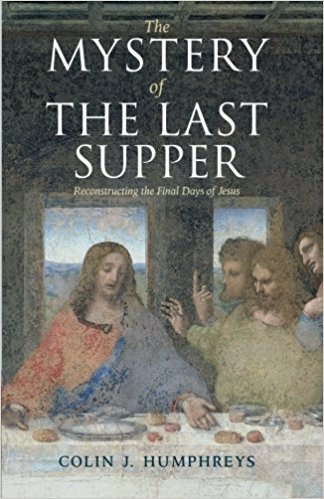If you read the gospels closely you will find what seems to be a major discrepancy in the accounts of Holy Week. It seems like the Last Supper takes place on Thursday night and that Matthew, Mark and Luke treat it as a Passover celebration. John, on the other hand, treats it as a meal that take place before Passover, because Jesus dies at the same time the Passover Lambs are being killed in the temple.
Furthermore, the timing is off. After the Last Supper Jesus is arrested in the Garden of Gethsamani. He is tried that night, and crucified at 9 am the next morning. There doesn’t seem to be enough time for the trial before the Sanhedrin, his first appearance before Pilate, his visit to Herod, the second visit to Pilate before his ultimate crucifixion. In addition, this time sequence doesn’t match the legal requirements of the Jews. One day had to elapse between condemnation and the fulfillment of the death sentence.
My friend Colin Humphreys has solved the problem. I met Colin while getting my book on the Magi off the ground. He was one of the few scholars who gave me, and the book some attention, and he was very generous with his time and kind about the book saying it was the best book on the Magi out there.
Colin wrote the book The Mystery of the Last Supper to give the whole detailed argument, but it comes down to the simple answer that the Jews of Jesus’ time were using two sacred calendars. The more ancient one dated back to Moses and was considered by many to be the “correct” one. The Jews in Jerusalem, on the other hand, used their “official” calendar which had been developed during the Babylonian exile.
Humphreys outlines the basics of the argument in this article. He claims that the Last Supper was held on the Wednesday night, and that the Jewish authorities allowed the faithful who followed the older calendar to keep their separate calendar (rather like the Vatican would allow traditionalists to maintain the old lectionary and calendar of saints if they wish.) Another example is the two calendars followed by the Eastern Orthodox and the Latin Church.
If Humphreys is right (and he makes an excellent case) then the Last Supper was indeed a Passover Meal, but it was held according to the alternate calendar on the Wednesday night. This means Jesus was arrested in the wee hours of Thursday. We then have all day Thursday for him to go before Pilate, before Herod and back to Pilate before his torture, then his execution, beginning on Friday morning.
Furthermore, if John was following the official Jewish calendar, he is also correct in seeing the Last Supper on the Wednesday as earlier than the official Passover, and he is also accurate in noting that Jesus dies on the same afternoon that the Passover lambs were slain.
Humphrey’s book is a terrific read. We became friends because his books, like my Magi book are books of historical and scientific research both done by amateurs. Humphreys is an eminent British scientist–not a theologian or New Testament scholar. Me? I’m a writer and priest, but not a historian or Bible scholar.
What is disappointing to both of us is the way our books have been ignored by the professional New Testament scholars. I wouldn’t mind at all if some the New Testament historians and Bible scholars read my Magi book and took it to pieces and proved me wrong.
Instead they simply ignore it. I don’t know, but I suspect they have done the same with Colin’s book–all the time churning out more articles about how the gospels must be a myth because there are these, “Oh Gosh!” terrible discrepancies in the gospels in the account of Holy Week.
Anyway, the problem is solved. We should shift the Mass of the Lord’s Supper to Wednesday Night. But if we can’t get the Bible scholars to take notice we are REALLY . not going to get anywhere with the liturgists!







[…] ChurchPop Here’s How to Make Holy Week Count – Patrick Coffin, National Catholic Register Was the Last Supper Really on Wednesday Night? – Fr. Dwight Longenecker The 3 Hacks to Successful Fundraising in the Catholic […]